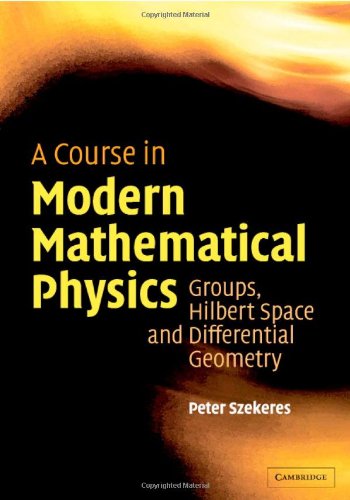A Course in Modern Mathematical Physics: Groups, Hilbert Space and Differential Geometry pdf free
Par fuller ernest le samedi, août 27 2016, 00:28 - Lien permanent
A Course in Modern Mathematical Physics: Groups, Hilbert Space and Differential Geometry by Peter Szekeres


A Course in Modern Mathematical Physics: Groups, Hilbert Space and Differential Geometry Peter Szekeres ebook
Publisher: Cambridge University Press
ISBN: 0521829607,
Format: djvu
Page: 613
For example, ordinary differential equations and symplectic geometry are generally viewed as purely mathematical disciplines, whereas dynamical systems and Hamiltonian mechanics belong to mathematical physics . Modern Modern Physics / Mathematical Physics / A Course in Modern Mathematical Physics - Groups, Hilbert Spaces and Diff. Physics - Groups, Hilbert Spaces and Differential Geometry - P. Günther, Presymplectic manifolds and the quantization of relativistic particles, Salamanca 1979, Proceedings, Differential Geometrical Methods In Mathematical Physics, 383-400 (1979). It's always nice to point out the structural similarieties between (semi-)Riemannian geometry and gauge field theories alla Classical yang Mills theories. Both theories are expressed in the language of modern differential geometry: manifolds, bundles, tensors & forms, metrics, connections, and curvature. Modern Physics / General Relativity Theory / Intro to Differential Geometry and General Relativity - S. Modern Physics / General Relativity Theory / Introduction To General Relativity - G. Nevertheless In modern terms, you can define any homogeneous space directly in terms of the group alone, by taking as points the coset of the point stabilizer. Paul Bamberg, Shlomo Sternberg. A course in mathematical statistics. A College Text-Book Of Physics - Kimball.pdf. A fairly comprehensive textbook with modern developments is . A course in mathematics for students of physics. A course in modern mathematical physics: groups, Hilbert space and differential geometry. We define the quantum Hilbert space, H , to be the space of all square-integrable sections of L that give zero when we take their covariant derivative at any point x in the direction of any vector in P x .